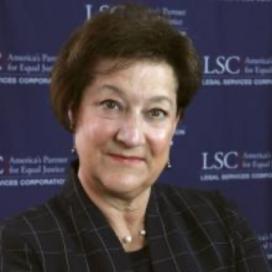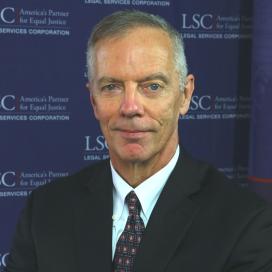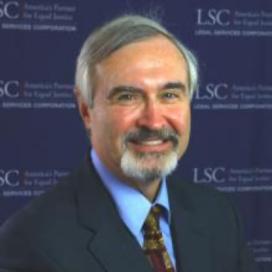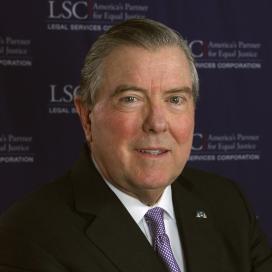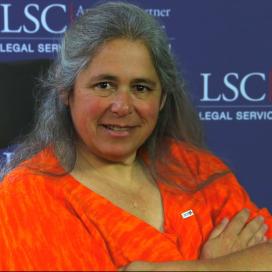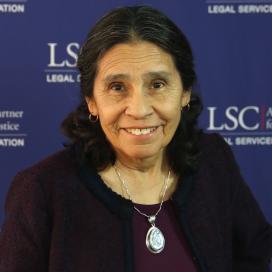Leadership
We intend the commemoration of LSC's anniversary to be a clarion call to educate the public about and protect the promise of access to justice for those facing these civil issues.
John G. Levi
Chairman
As the Legal Services Corporation and its grantees looked forward to commemorating LSC’s 50th Anniversary in the coming year, the more than 12,000 lawyers and staff at LSC’s 131 grantees across the country spent 2023 grappling with a host of civil legal problems, many created or magnified by the pandemic.
Although COVID-19 began to fade as a public health crisis, it left many civil legal challenges in its wake such as a rise in domestic violence (up more than 9% since 2021) and housing insecurity issues which were expanded by the end of eviction moratoria, rental assistance initiatives and eviction diversion programs. In fact, in 2022, 41.3% of the cases closed by LSC grantees were housing cases, the first time one case type comprised such a large portion of cases closed in a year.
LSC’s Housing Task Force released four issue briefs on legal problems related to housing insecurity, illegal evictions, manufactured housing, extended-stay motels and contracts-for-deed housing arrangements. Together, the series alarmingly illustrates that many housing options that are financially accessible to low-income individuals do little to relieve their housing insecurity and often further jeopardize their financial well-being.
Housing insecurity is also a pressing problem for veterans and was the focus of LSC’s annual Veterans Day forum which featured Florida Rep. Laurel Lee and veterans advocates.
LSC Leaders Council member, best - selling author John Grisham, also pointed to personal experience at a March Justice Forum in Washington D.C. to explain the significance of legal representation in eviction and housing matters, recalling his pro bono work for trailer park residents in Mississippi as he began his legal career:
“It’s astonishing what happens when you’re a lawyer and you take the case of a person who cannot afford to pay you, or somebody who’s not supposed to have a lawyer, and you pick up the phone or you show up in court with them and everything changes—the whole game changes— suddenly they have respect and they get a fair hearing.”
Many LSC grantees also struggled to meet the civil legal needs created by hurricanes, wildfires, earthquakes, floods and severe storms. More than 4.75 million people in areas affected by these natural disasters this year qualified for LSC-funded legal aid.
LSC assisted in these efforts by awarding nearly $20 million in disaster relief funding to 14 grantees. This emergency supplemental funding was included in the FY 2023 appropriations act passed by Congress.
For the FY 2024 appropriations act, the White House submitted a supplemental request to Congress that included $21 million in disaster relief for LSC. This was the first time that the White House included funds for LSC in a request for disaster relief, and it represents a significant milestone in LSC’s continuing efforts through its Disaster Task Force and other initiatives to demonstrate that civil legal services providers are a critical component of comprehensive disaster recovery.
LSC also launched a new resource to help disaster survivors, the Heartland Disaster Help website, with the support of private funds. This new resource is designed to empower residents across ten states in America’s heartland that have faced significant flooding, windstorms, extreme heat and wildfires over the past decade.
Key features of the website include real-time disaster risk assessment by home address, details on recent disasters, recovery guidance and comprehensive information for each disaster type. Users can instantly check their risk levels for floods, windstorms, extreme heat and wildfires.
Throughout the year, LSC continued to raise public awareness of the crisis in civil legal aid at access to justice forums in conjunction with LSC Board meetings in Phoenix; Washington, D.C.; New York City and Los Angeles and through “Talk Justice” podcasts.
LSC once again exerted leadership in technology through its Innovations in Technology Conference in Phoenix and with its Technology Initiative Grants program, now in its 23rd year. Since 2014, LSC has also promoted pro bono through its Pro Bono Innovation Fund.
In April, the Board made an important addition to LSC leadership by naming Tom Yatsco as the new Inspector General.
The year drew to a close at the dawn of LSC’s milestone 50th anniversary year.
On July 25, 1974, President Richard Nixon signed the LSC Act, noting that legal assistance for the poor protects a basic right:
“We have learned that legal assistance for the poor, when properly provided, is one of the most constructive ways to help them help themselves,” he said. “We propose, simply, to protect and preserve a basic right for all Americans.”
This basic right, equal access to justice, is a foundational promise of the American experiment, and LSC will be dedicating its 50th Anniversary commemoration to celebrating and preserving it in an outreach campaign we have branded Protecting the Promise.
The many projects, events and initiatives we have planned for this coming year across the country will shed new light on a wide variety of issues relating to equal access to justice and our urgent need to do much more to protect this core value.
LSC’s 2022 Justice Gap Report quantifies this observation, revealing that low-income Americans do not receive any or enough legal help for 92% of their substantial civil legal problems.
So, as grateful as we are that Congress has increased LSC funding to $560 million, clearly much, much more is needed to close the justice gap which has been driven in large part by years of wholly inadequate resourcing.
In 1994, nearly 30 years ago, Congress appropriated $400 million for LSC. Our current funding is not remotely enough to keep up with inflation, population growth, the after-effects of the COVID-19 pandemic and the many issues that confront our country’s significant low-income population.
In March, LSC requested from Congress an appropriation of $1.5 billion for its FY 2024 budget. This request accounts for the ongoing serious lack of adequate resources to address the widening justice gap, only exacerbated by the impact of the COVID-19 pandemic on low-income Americans.
We intend the commemoration of LSC’s anniversary to be a clarion call to educate the public about and protect the promise of access to justice for those facing these civil issues.
The stakes are extraordinarily high, as Ivan Fong, the executive vice president and general counsel and secretary at Medtronic, observed at our Justice Forum on Capitol Hill in March:
“When people don’t have access to justice, or even perceive that they can’t get a fair shake in our court system, that erodes our commitment to equal justice under the law and to the rule of law. The consequence of this failure... is that it risks causing people to lose faith in our democratic system and our system of justice.”
Our Protect the Promise campaign will seek to raise awareness of the importance of access to justice, engage our supporters by building communities of stakeholders across the country and recruit new advocates from many sectors of society.
Every advocate is important. In a 1964 speech at the University of Chicago Law School, then Attorney General Robert F. Kennedy called for lawyers to do more to provide legal assistance for the poor, noting that “each time a man stands up for an ideal…or acts to improve the lot of others, or strikes out against injustice, he sends forth a tiny ripple of hope, and those ripples build a current which can sweep down the mightiest walls….”
Ten years later, the ripple Bobby Kennedy described in his remarks became the current known as the Legal Services Corporation, and for five decades it has joined with its grantees in sweeping away many hurdles to equal access to justice for low-income Americans.
Significant barriers remain, unfortunately, and as we prepare to recognize our 50th anniversary, we will redouble our commitment and efforts to finally make the promise of equal justice for all a lived reality for all Americans.

John G. Levi
Chairman

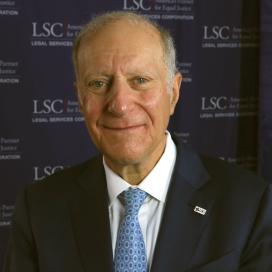
![Father Pius Retouched Headshot 2.3[1].jpg](/sites/default/files/styles/people_272x272/public/images/2021/02/Father%20Pius%20Retouched%20Headshot%202.3%5B1%5D.jpg?itok=aqWg8fbi)
![Robert Grey Retouched Headshot 2.3[1].jpg](/sites/default/files/styles/people_272x272/public/images/2021/02/Robert%20Grey%20Retouched%20Headshot%202.3%5B1%5D.jpg?itok=XWrYh1dx)
